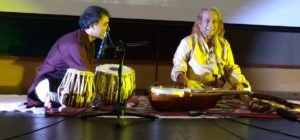”˜Make sure your children appreciate and learn good art’: Ustad Ashish Khan
By Aradhana Bhatt
For classical music lovers of Sydney it has become a rare treat to listen to performances by visiting artists. We have had some top grade musicians like Pt Hariprasad Chaurasia and Pt Shivkumar Sharma, Begum Parveen Sultana and Pt Jasraj perform in Australia in the past decades, but somehow that flow has now ceased. So it was with anticipation that we were looking forward to Ustad Ashish Khan’s debut concert in Sydney on Friday, 14th July at Pioneer Room, Castle Grand.
The evening began with two well-choreographed Kathak performances by Ruchi Sanghi Dance Company-Sydney’s well-known Kathak school. It was a cosy event attended by a small but responsive and disciplined audience and Khan Saab seemed to respond to the spontaneous applause and the ”˜Wah, Wah’s’. Beginning the evening with Raga Hem-Bihag with an Aalap, Jod and Jhala he moved to another lesser known Raga Chandranandan. Bobby Singh did justice to the maestro accompanying on his tabla and the duo regaled as they concluded the Bhairavi themed ”˜Raga-Malika’ with a ”˜sawal-javaab’ finale. Ustad Asish Khan opened the concert with a few words admitting his love for cricket and hence his long-time-wish to visit Australia.
The highlight of the night however was the maestro’s announcement of the beginning of ”˜Ustad Ashish Khan’s School of World Music’ in Sydney, a school that has been a long-time dream of Khan Saab with the goal to see his senior students from around the world visiting Sydney and run workshops here for serious music students of all backgrounds.
It was a privilege to be able to converse with the versatile musician prior to the concert about his lineage and training. Ustad Ashish Khan, son of the legendary Sarod player Ustad Ali Akbar Khan, hails from the ”˜Senia-Maihar Gharana’ or school of classical music which was initiated by his legendary grand-father Baba Allauddin Khan. He talked candidly about his family connections and his work with Pt Ravishankar, who was first married to Annapurna Devi, the great Soor-Bahar player and daughter of Baba Allauddin Khan. Having grown up in Maihar and Kolkata, Ashish Khan gained strict and disciplined training from ”˜Baba’, a period when he used to learn and practice for twelve hours a day, did not gain formal schooling and hardly played with kids his age.
When asked about his feelings on being nominated for the Grammy on 2006, he said he felt honoured especially because his nomination was in the Classical Music category and not for Rock or Pop Music. He thus represented his tradition and his country. Among the many accolades Ustad Ashish Khan is also a recipient of the Sangeet Natak Academy’s award, the highest music award of India.
“Despite hailing from a lineage like this, what made you move and settle in the USA?’ I ask. His tone turns a little sour then and he admits to feeling a little sidelined, being constantly compared with his illustrious family, not getting enough concerts. America opened up avenues for him that he had hardly dreamt of treading while in India and he joined hands with the legendary tabla player Ustad Zakir Hussein and later with stalwarts like George Harrison, the Philadelphia String Quartet, John Barham and the Beatles to form bands of World Music- “Shanti’ and ”˜The Third Eye’. Currently he serves as adjunct professor in Indian Classical Music at the California Institute of Arts, LA, USA. He speaks a little dis-enchantedly about audiences of classical music in India and complains about their lack of discipline while appreciating Western audiences for the way they respond to Indian music.
Ustad Ashish Khan has often been referred to as Ustad Ashish Khan Debsharma in the media. ”˜There have been some controversies regarding your names, Khan Saab’, I hesitantly inquire. “Yes”, he says promptly, “people can say whatever they want to say. All of us brothers and sisters were named by my grand-father. My brothers’ names Dhyanesh and Pranesh and my sister Shree are all Hindu names. Most of my other brothers and sisters are from my father’s second wife Rajdulari Khan and have Hindu names too. Then I adopted the surname ”˜Debsharma’ to keep the history alive. We are converted Muslims and our forefathers were Hindu Brahmins. I want to show to the world and our future generations where our roots are from. In our family, we have always treated and respected all religions the same. Our ”˜Baba’ never insisted that we do five ”˜namaz’ a day or that we observe Ramzaan. Religion is a very personal matter and it is very sad to see what is going on in the world today in the name of religion.”
“Your message to the lovers of music, Khan Saab?” I ask. “I’d like to ask parents to keep their young ones away from this Bollywood garbage as it is hindering their vision. The dances that you see on Indian TV today are hardly dances. We have such lovely dance styles in India like Bharatnatyam, Kuchipudi, Kathak and Manipuri and so many forms of folk-dances. Just as you wish that your children should have good education and become doctors or scientists, please make sure that they learn good art.”
Short URL: https://indiandownunder.com.au/?p=9235


